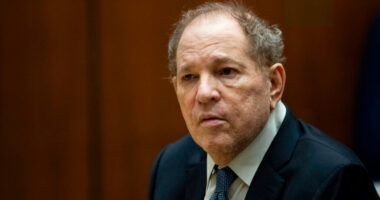**MAJOR SPOILERS AHEAD FOR THE WHITE LOTUS SEASON THREE **
The third season finale of The White Lotus has recently aired, receiving a different reception compared to its successful predecessors. While the first two seasons were highly praised by both viewers and critics, the latest chapter has been met with lukewarm reviews.
This season consisted of eight episodes, which was an increase from the six episodes in season one and seven episodes in season two. Additionally, the finale of this season recorded the highest number of character deaths in the series.
The final episode, set in Thailand, featured the demise of beloved character Chelsea, portrayed by the talented Aimee Lou Wood, Rick (played by Walton Goggins), the resort owner Jim Hollinger (portrayed by Scott Glenn), and a couple of bodyguards among others.
The pacy finale had fans tweeting along at furious speed but once the gunfire had died away, many critics were left with a sour aftertaste.
Many blamed the show’s creator Mike White, musing that the celebrated writer has checked out of his smash hit TV show, or at the very least has sent it on a meandering journey, destination unknown.
Adam White for The Independent called the finale ‘a violent end to a bad season’ and urged Mike White to ‘go back to basics’ for his fourth season, which is rumoured to be changing tack, in terms of location at least.

The White Lotus has aired its season three finale and after two series of five star satisfaction from fans and critics, the third conclusion has been met with lacklustre reviews
‘Season three seemed more driven by its own mystery than ever before, with too many death fakeouts, too many possible murderers, and more Chekhov’s guns than the show knew what to do with. And it’s ended up making people talk about The White Lotus as if it’s Lost or Severance, or some other puzzle-box series riddled with Easter eggs and clues that require our solving,’ Adam White writes.
‘White is a master when it comes to interpersonal dynamics and writing about our propensity for cruelty, arrogance and self-involvement. But after these draining eight episodes, he should avoid the mystery trap and stop there.’
Erik Kain for Forbes went a step further by declaring the conclusion ‘a crushing disappointment.’ Kain didn’t hold back, opening his review with this bold statement:
‘I could walk across the sand of my imagination and dig up so many of words to describe the Season 3 finale…’Tragic’ might be one of them, and certainly there was tragedy here. ‘Disappointing’ might be another, and I am feeling terribly disappointed as I type this. ‘Indulgent,’ also, because I’m afraid that the success of the first two seasons must have gone to Mike White’s head. What a mess. What a waste of time.’
‘This was the least satisfying, least funny, least shocking, least impressive season of White Lotus so far. Had it been the first, I’m not sure we’d ever have gotten a second, let alone a third.’
Kathryn VanArendonk for Vulture at least noticed flashes of light in the darkness, pointing out that ‘in sequences — especially Lochlan’s almost-death and Laurie’s monologue — there are flashes where it’s clear that a sturdier, more balanced approach to this season might have resulted in something transcendent.’
But ultimately decided that ‘instead, season three dawdles too long, trying to save too much of the good stuff for the end. Oddly, that’s exactly the lesson Laurie’s monologue was trying to teach, and the one The White Lotus fails to achieve. It’s not about one final moment, or one spectacular achievement of surprise that no one could see coming. The pleasure is supposed to be in the journey.’
Alan Sepinwall for Rolling Stone pointed out the ‘nonsensical’ plot points, arguing that ‘if the resort was going to be host to such a horrific event — not so long after people died violently either on or near two other White Lotus properties over the last few years — then the show needs to be prepared to deal with the consequences of that. You can’t just put everyone on boats like everything is normal, and have Pornchai and the other staffers waving goodbye from shore, when everyone would be getting interviewed by the local police at this point. It was simultaneously predictable and nonsensical.’

The eight episode run was a bump up from six episodes in season one and seven for season two, and also saw the most number of deaths for a finale

The pacy finale had fans tweeting along at furious speed but once the gunfire had died away, many critics were left with a sour aftertaste

Many blamed Mike White, musing that the celebrated writer has c hecked out of his smash hit TV show, or at the very least has sent it on a meandering journey, destination unknown
Richard Lawson for Vanity Fair mused that ‘this was a sadder, more contemplative season, and I wish White had leaned into that even further, to give us something sweeping and declarative about the state of humanity today.’
‘But maybe that’s just not White’s style. He did, at least, deliver a tense and propulsive ending, one that made up for the more plodding, listless episodes earlier in the season.’
‘The White Lotus is still easily one of the best shows on television, a sharply acted and lyrically written series that, with grim humor and melancholy, reflects a particularly modern anxiety and malaise.’
Speaking to The Hollywood Reporter White himself explained that his message with his latest season was clear throughout.

Adam White for The Independent called the finale ‘a violent end to a bad season’ and urged Mike White to ‘go back to basics’

Erik Kain for Forbes went a step further by declaring the conclusion ‘a crushing disappointment’
‘This season, at least from how I was composing it, is using Buddhist ideas as the organizing principle, trying to think about identity as a cause of suffering,’ he explained. ‘I think of identity as this way of thinking about yourself in these concrete, literal terms that then end up becoming a source of pain for you. It can be a source of pride, but it also becomes a source of pain.’
Admitting his change of tone, White pointed out that ‘basically, the whole thing is really a kind of dramatic investigation. And that is why the writing is a little different than the other ones.’
‘Obviously, there are satirical elements, but there is a kind of Buddhist parable. Like the Rick (Goggins) story. It’s a little more hard-boiled than something that I usually write.’

















